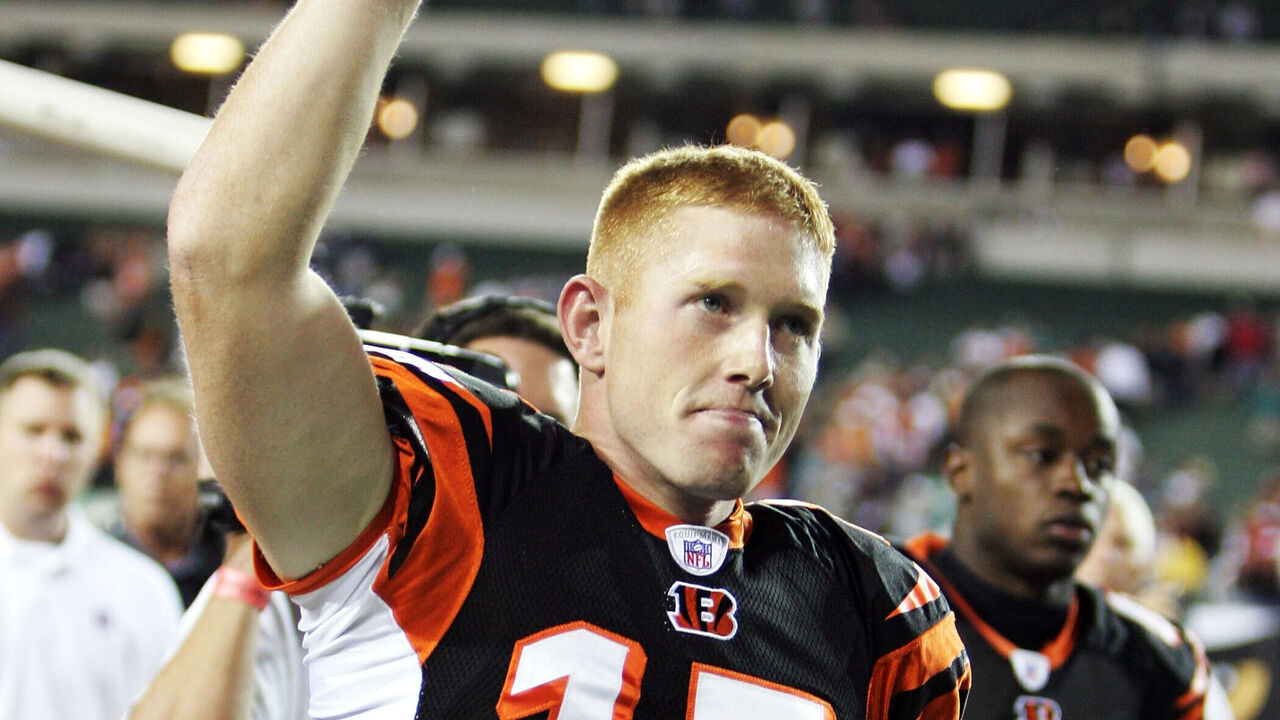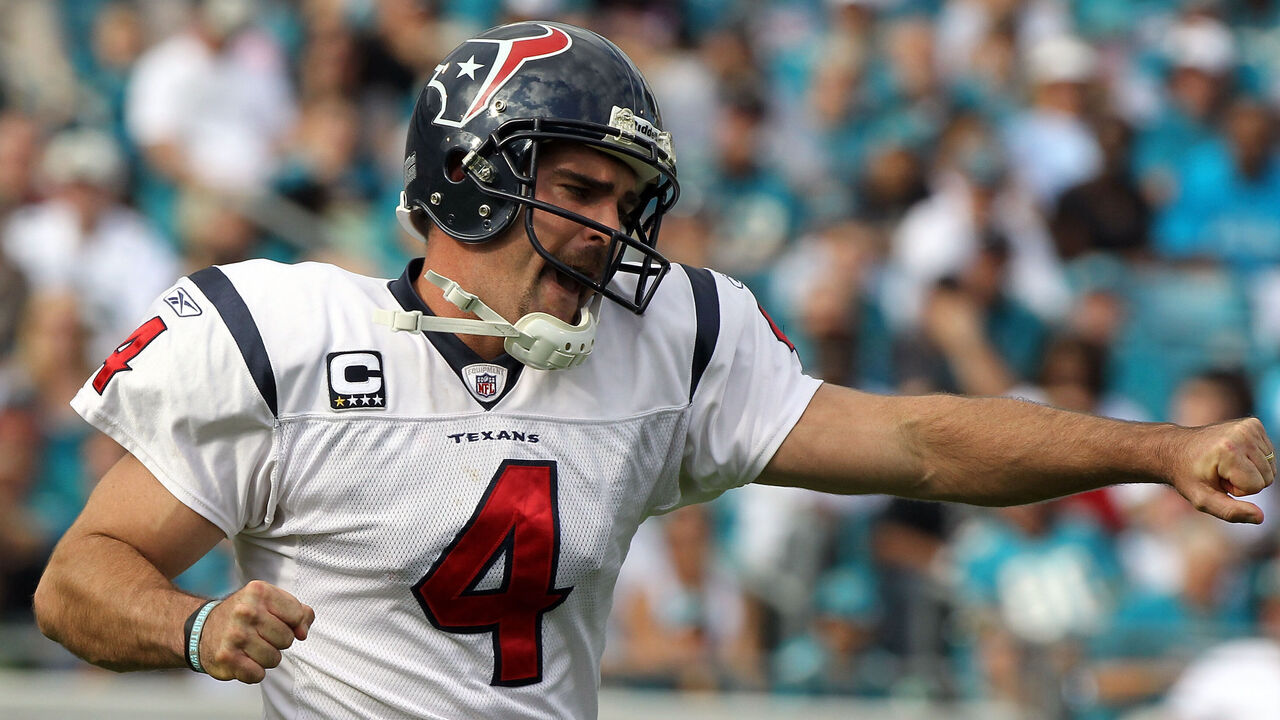Inside the lost art of the NFL kicker tackle
When the NFL overhauled kickoff rules to create more returns this season, the change had the potential to revive a rare, electrifying play: the kicker tackle.
Retired kickers like Shayne Graham racked up plenty of takedowns. His single-season record of 11 tackles for the 2005 Bengals included a clutch wrap-up of Josh Cribbs, the uncatchable Browns returner, in a tie game that Graham won for Cincinnati with a walk-off field goal.
"Guys slap you on the helmet, give you the chest bumps, and give you the things that you typically didn't get to experience after kicking a field goal," Graham reminisced about making a tackle in a recent interview. "If my jersey was dirty at the end of the game, it wasn't something that (fueled) the stereotype of kickers having the cleanest jersey and being kind of soft."

Another bruiser at the position, Shaun Suisham, wore hockey shoulder pads with the Steelers to channel the ferocity of his childhood sport in Canada. The NFL's most physical kicker in 2011 (five tackles) and 2013 (seven), Suisham laid blows that delighted teammates in the heat of battle and during the following week's meetings.
"Mike Tomlin would roll back the film and replay it over and over again for the guys," Suisham said. "That made (tackling) pretty fun for me. A lot of really great moments when you feel like you're able to impact the game beyond just the kick."
To rock a kick returner, the kicker first needs to put the ball in play, which happened less than ever in 2023. Returns cratered as a huge share of kickoffs - 73% - went into the end zone for touchbacks.
To combat tedium, reduce injuries, and make the kickoff relevant again, the league adapted the radical format used in recent years in the XFL.
So-called dynamic kickoffs in the NFL are taken from the 35-yard line while the kicker's teammates stand in the opposing end, moving once the ball is caught or lands inside the 20. Touchbacks are spotted at the 30, while short kicks are penalized and spotted at the 40. Under the new rules, returns increased modestly in Week 1.
There were no kicker tackles last week, though Tyler Bass' failure to stop DeeJay Dallas in the Bills-Cardinals game capped a series of breakdowns that led to the first dynamic return score.
DEEJAY DALLAS OH MYYYYYY 🤯🤯🤯 pic.twitter.com/sLx2L16aLV
— Arizona Cardinals (@AZCardinals) September 8, 2024
Practitioners of this lost art considered tackling a sporadic yet meaningful duty that showed off a kicker's athleticism, toughness, and devotion to the team. Depending on where they threw the body, their hits could pin the opponent deep, mute the excitement of a long return, or spoil a touchdown while firing up the sideline.
"When you got in on some contact, it felt good to do that because there is a stereotype that kickers aren't really part of the team and aren't really football players," Graham said. "Those of us who had a lot of tackles in our career really take pride in the fact that we were never looked at like that."
Growing a tackle count is contingent on opportunity. The most accomplished kicker-hitters almost exclusively played during the 17 seasons (1994-2010) when the league booted kickoffs from the 30-yard line, not the 35, and there were fewer touchbacks.
No kicker has recorded five tackles in a season since Arizona's Chandler Catanzaro in 2015, per Stathead. Three kickers who notched two tackles in 2023 - Cleveland's Dustin Hopkins, Houston's Ka'imi Fairbairn, and Minnesota's Greg Joseph - co-led the league.
Once upon a time, protecting the house gratified Matt Bosher, who averaged a tackle every five games and didn't allow a return touchdown over nine years as the Falcons' kickoff specialist.
"That was something I never wanted to give up. It's cheesy as all hell, but I named my boat No Returns. I didn't plan on changing it to One Return," Bosher said. "My thing was: I wasn't going to let you get past me. I'm going to grab you by your ankle, or I'm going to step up. Run me over - I don't care. I'm going to grab you, hold on, and go for a ride."
Top kickoff hitters embraced contact in high school - Bosher moonlighted at right guard and defensive end - and confidently sought out hits in the NFL. Suisham found it easier to sprint forward to fill gaps in the initial wave of coverage than to try to trip a ball carrier while backpedaling at midfield. The approach helped him floor Lardarius Webb on the opening play when Pittsburgh edged Baltimore by a touchdown in the 2010 postseason.

The Bengals deployed Graham aggressively. Special teams coach Darrin Simmons refined Graham's tackling technique in drills - "We weren't just diving at ankles like a lot of guys will do," Graham said - and shared tips on how to angle a returner toward the sideline or line up a hit in the middle of a crowd before he gained steam.
"I could make the tackle before he had a lot of open space down the field, where it was easy for him to make a quick move to try to get me off balance," Graham said. "I liked to be able to get them as they're breaking through a hole. That way, I could either wrap up on them or put a shoulder into them to have a little more influence in taking them down."
Hitting mattered to a generation of kickers, The New York Times wrote in a 2008 story that relayed colorful details about Jay Feely, the position's "most aggressive and perhaps craziest tackler." Feely, who wore gloves to tackle and run with the ball on trick plays, made friendly bets with kindred spirit Neil Rackers over who'd throw more hits in their head-to-head matchups.
Rackers, the No. 1 career kicker tackler, shot the gap in his final NFL season with the Texans to truck Marc Mariani before triumphantly punching the air. Feely wrestled Eric Decker to the ground in a Cardinals win in which he outscored the Broncos by himself, tallying 25 points via five field goals, four PATs, and a rushing TD on a fake kick.
He's made 27 game-winning kicks, two in the Super Bowl.
— NFL Legacy (@NFLLegacy) October 18, 2018
But this might be the most impressive play of @adamvinatieri's career...
(Dec. 15, 1996) @Patriots pic.twitter.com/BR7FGIjU0G
Kickoff tackles create lasting memories. Future Super Bowl hero Adam Vinatieri chased down Herschel Walker as a rookie with New England. Denver's Todd Sauerbrun forced a fumble against the dynastic Patriots in the 2005 divisional round. The Colts' Pat McAfee grew his celebrity on Sunday Night Football by causing 5-foot-5 returner Trindon Holliday to take flight.
"Those moments don't happen very often. When they do, they're special. It's one of the only ways you can truly show your team that you're committed and willing to put your face right in it," Suisham said. "Those are elite athletes, and you found a way to get them in that moment. Most times, they're going to win that battle."
IS THAT @MATTBOSHER5 OR @KEANU_NEAL?!?!?!?! pic.twitter.com/JDfly0zSrY
— Atlanta Falcons (@AtlantaFalcons) December 23, 2018
In Bosher's post-playing business, some of his property management clients in South Florida have Googled, then phoned to rave about his body slam of Carolina's Kenjon Barner in 2018. It's a cool icebreaker, Bosher said, that even helped him and Barner connect when the returner signed with Atlanta the following season.
"He always said that his son had a funny joke," Bosher said. "(Barner) was telling his kid to take out the garbage. He was like: 'I'm not going to take it out. If you want me to take it out, go talk to Matt Bosher.'"
The XFL's reimagination of the kickoff thrust kickers into the fray. After scouting the format in the offseason, Chiefs special teams coordinator Dave Toub said XFL kickers were involved in more than 25% of tackles, either by attempting them or forcing the returner to change direction.
Expecting collisions to rise, Browns special teams coordinator Bubba Ventrone spoke to the club's secondary coaches about including kickers in tackling drills. Watching XFL clips inspired Ravens legend Justin Tucker, who has eight tackles in 196 career games, to lift more weights to prepare for contact.
"It is something you're going to think about, especially with this new, more dynamic kickoff," said Taylor Russolino, the kicker for the 2023 XFL champion Arlington Renegades. "If that returner hits the first hole pretty fast and it opens up quickly, that kicker's going to be approached in the blink of an eye."

Key differences between the XFL and NFL rules may limit kicker hits. As XFL kickoff inventor Sam Schwartzstein emphasized, NFL kickers can't cross midfield until the ball's caught, which distances them from the returner and slows their running start.
Also, the NFL touchback rule isn't punitive, as theScore's Dan Wilkins observed after Week 1, when almost two-thirds of kickoffs (64.5%) died in the end zone. Teams mostly opted to start defending at the 30 instead of trying to stuff the returner or manipulate the ball's flight path to bounce or curve it away from him.
"If they (moved touchbacks to) the 35 or the 40, that would really force teams to kick it into that landing zone between the zero and the 20," Russolino told theScore in an interview ahead of Week 1. "This season, I think you'll see half the teams kick it through the end zone, and half the teams play around with different kicks."
If strategies evolve this season, Suisham wondered whether teams will tap safeties with big legs to handle some kickoffs and be the last line of defense. That would put an 11th seasoned tackler on the field and lessen the kicker's exposure to injury, which can ruin seasons.
Suisham suffered a noncontact ACL tear on his final NFL play while covering a kickoff in the preseason Hall of Fame Game. Following last year's XFL-USFL merger, kicker Donald De La Haye - known online as the popular YouTuber "Deestroying" - exhibited the risks of poor tackling form when he fractured his neck in the newly united spring league.
Get yourself a kicker who isn't afraid to HIT 💥@Deestroying wasn't holding back on this one 😤 pic.twitter.com/i1PVbWjGj0
— San Antonio Brahmas (@XFLBrahmas) April 6, 2024
"The kickoff at full speed is a violent action. It's hard on your back. It's hard on your body, especially as you age and the season goes on," Suisham said. "I wouldn't be surprised if you see more (defensive players kicking off) to protect the kicker. They're going to be involved in a lot more plays, potentially. Everybody loves a kicker who makes tackles until it ends their career. That can happen."
The geometry of the dynamic kickoff heightens a kicker's responsibilities. Being spread wide upfield makes it difficult for the coverage team to swarm or corner the returner in a thicket of bodies, Graham pointed out. The kicker can't cross the 50 prematurely, but he's the one defender who can take a direct, minimally impeded route to the ball.
When contact is imminent, the worst thing to do is flinch or hesitate.
"For me, the biggest mentality was not being afraid," Graham said. "When you feel, 'Hey, I can deliver this tackle while being aggressive,' that's when you're more protected. You're in control of your body. You're able to try to execute a technique versus just throwing your body in the way."
Nick Faris is a features writer at theScore